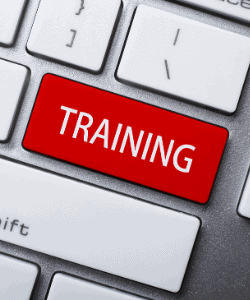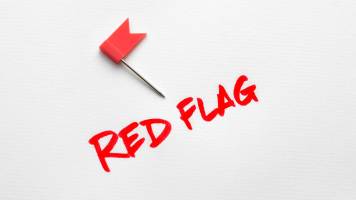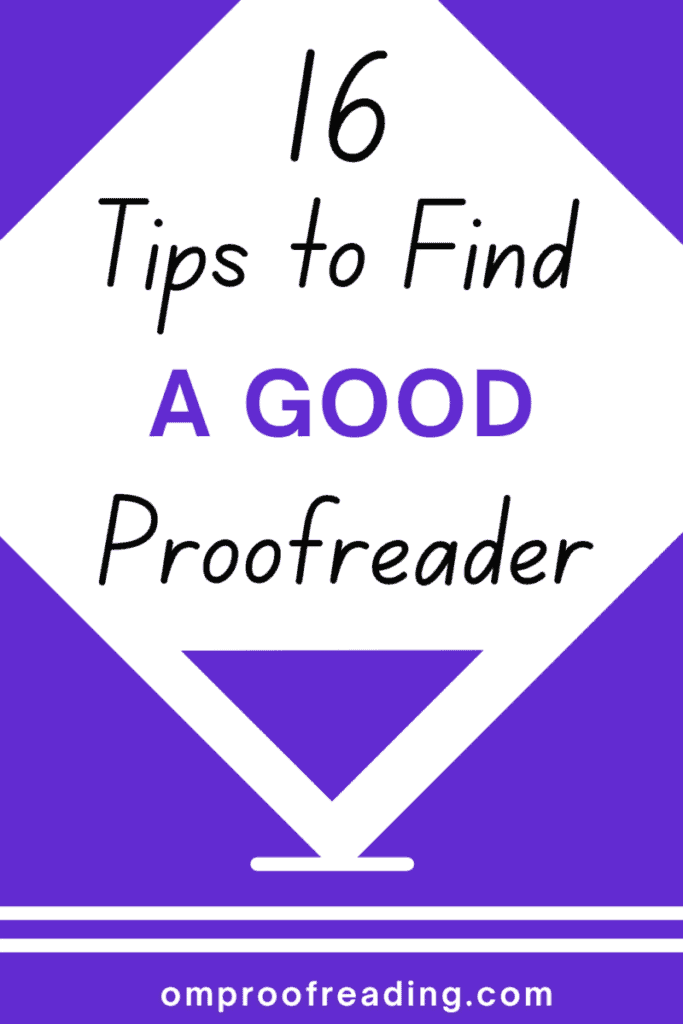This article may contain affiliate links. Please see our affiliate disclaimer in the footer menu for more information. Thank you for your support!

Finding a good proofreader takes time, but it’s worth the effort. I’ll explain how to determine whether a proofreader can provide high-quality work and tell you where to find proofreaders to fit any budget.
Tips 1–13 will give you the inside scoop on how to find a proficient proofreader, and tips 14–16 will let you know where to find them.
Find a Good Proofreader with These Top-Notch Tips
1) Understand the difference between proofreading and editing.
Before you search for a proofreader, it’s ideal to know exactly what proofreading entails.
Proofreading involves locating and fixing grammar, capitalization, punctuation, spelling, and formatting errors. A proofreader also looks for missing or repeated words and ensures words are used correctly (e.g., affect vs. effect, principle vs. principal, to vs. too vs. two).
A proofreader does not fix syntax (sentence structure) or make the writing concise, clear, consistent, comprehensive, and correct. That’s a copy editor’s job.
If you’d like more information about how we used to think of the word proofreading and how we think of it now, please see my post that discusses proofreading. This article also goes into detail about the kinds of mistakes proofreaders look for and the complete editorial process—from developmental editing down to proofreading.
2) Get a sample edit if you have a long text like a book.
This is one of the most valuable tips I can give you! 😊
If you have a lengthy piece of writing (e.g., a book manuscript), the proofreader will give you a sample edit so that they can estimate how much work your writing needs. A sample edit means they’ll proofread a small section, about 1,000 words, typically taken from the middle of your text.
Most proofreaders charge for this, but some do not.
You can review the sample edit to see if you’d be satisfied with their work.
If it’s within your budget, I recommend finding two or three proofreaders to give you a sample edit.
This way, you’ll be able to determine who would be the best fit after seeing each sample.
Even if your document is much shorter than a book manuscript, you can still ask for a sample edit relative to the size of your piece of writing.
3) Know the proofreader’s qualifications.

If someone has a degree in English or journalism, it’s certainly a plus, but it doesn’t guarantee they would be a great proofreader. In fact, if that’s their only qualification, they probably won’t be.
Proofreading is a skill that’s developed with specialized training and practice.
If I hired a proofreader, I would choose someone who completed a reputable proofreading course over someone who just had a college degree every time.
I have a psychology degree and did a lot of writing in college. However, that degree didn’t prepare me to be a proofreader.
Proofreading is far more complex than most people realize. If someone has trained with any of the following organizations, it’s a good sign:
- The Chartered Institute of Editing and Proofreading (CIEP)—based in the UK
- The Publishing Training Centre—based in the UK
- Proofread Anywhere—based in the US
- Knowadays—based in the UK
These big names from the US and UK have earned a solid reputation.
Just because someone took a proofreading course doesn’t mean they passed the final exam.
The organizations above provide a certificate that indicates whether the student passed the class.
4) Question them about the style guide they use.
A professional proofreader will be familiar with at least one major style guide.

If you ask them which style guide they use and they don’t have an answer, it’s a red flag.
Professional proofreaders use style guides to maintain consistency throughout a document and ensure that writing is properly prepared for its purpose.
The Chicago Manual of Style is the most widely used style guide for US English. It can be used to proof numerous texts, but it’s best known as the go-to style guide for book publishing.
On the other hand, newspapers are edited and proofread according to The Associated Press Stylebook—another major style guide.
Your future proofreader should have an excellent grasp of the style guide indicated for your genre of writing.
Note: The go-to guide for those who proof British English is New Hart’s Rules: The Oxford Style Guide.
5) Ask about what kinds of English they work with.
It may seem like a strange question, but proofreaders will understand.
It’s helpful to divide English into four main dialects: US, UK, Canadian, and Australian.
There are significant spelling, grammar, punctuation, and vocabulary differences between US and UK English.
Australian English is comparable to British English in spelling, but vocabulary differences exist.
And according to this article from the BBC, Canadians claim that Canadian English is more like British English than American English.
Just make sure the person you choose is comfortable proofreading your style of English.
6) Inquire about their experience.
If a proofreader has experience, that’s certainly a vote in their favor. The more years, the better.
If they have practice proofreading the format of writing (e.g., book, blog post, press release, résumé) you need polished, that’s also a vote for them.
Finally, if they’re exceptionally knowledgeable about the subject matter—that’s another vote!
A proofreader who knows the terms specific to your industry and understands your content will have an easier time polishing your text.
They’ll be more likely to notice if an egregious factual error slipped through the cracks.
And although proofreaders aren’t responsible for fact-checking, they’ll let you know if they see a significant slipup in your sentences.
7) Look at the reviews they’ve received from past jobs.

Carefully read a proofreader’s evaluations to determine how they’ve performed in the past.
If the proofreader has their own business, they’ll probably have testimonials posted on their website.
If they work on a freelance platform, the reviews will be part of their profile. When reading the critiques, ask yourself the following questions:
- Do the reviews mention that this person returns documents on time?
- Do they suggest that the proofreader is meticulous?
- Do you get the idea that they’re friendly and professional?
Consider what you want most, and see if the evaluations match your needs.
8) Check out the proofreader’s portfolio if they have one.
Proofreaders working on freelance sites and those with their own websites will sometimes have a portfolio.
For example, I’ve done a lot of work for clients on Fiverr (a popular freelance platform). Proofreaders on Fiverr can display a portfolio showing screenshots of their most recent projects along with the client’s review for that specific document.
Of course, the client can choose whether they want a screenshot to be displayed.
Taking a quick look at this portfolio will give you a general idea of how the proofreader typically corrects a text.
But keep in mind that not every proofreading job is the same since some clients have their own style guide or pay them for additional services (like providing feedback).
9) Have a ballpark idea of what qualified proofreaders charge.

Proofreaders charge rates according to their level of training, experience, and expertise.
Let’s look at the typical pay range for proofreaders.
The Editorial Freelancers Association (EFA) in the US surveyed its members to acquire data for their median rates chart.
EFA members who proofread nonfiction charge $40–$50 per hour ($.02–$.03/word) with a pace of 7–11 pages per hour.
The industry standard for a manuscript page is 250 words.
The EFA notes that these rates are approximations since prices vary significantly depending on several factors, including the expected turnaround, the scope of work, and the degree of expertise necessary.
The CIEP in the UK recommends a minimum hourly rate of £29.85. It also points out that prices are based on a variety of elements.
Note: Professional proofreaders typically work with texts that have already been copyedited. If the proofreader will be the only person (besides you) to look at your writing, you’ll likely need to pay a higher rate unless your text is very well written.
10) Find out if they charge by the word, the page, or the hour.
Not all proofreaders charge the same way.
The most popular way to charge is by the word; the next most popular way is by the hour.
Choosing a proofreader who charges by the word ensures you know exactly how much your project will cost.
However, that’s not to say you shouldn’t consider people who charge by the hour.
11) Observe their written communication skills.
If you’re looking at a proofreader’s website or their profile on a freelance marketplace, it shouldn’t be full of glaring errors.
If you’d like to check their writing skills, you can ask them a question. Pay attention to the written reply you get back.
If it contains a few too many flubs, that’s probably a red flag.
12) See if your family or friends know a good proofreader.
Word of mouth can be the best way to discover a qualified proofreader.
Do you have friends or family members who are writers or have recently hired a proofreader?
Getting a recommendation from someone you know and trust is always a plus.
13) Ask writers in online groups who they think is best.

Online groups can be a treasure trove of knowledge.
LinkedIn and Facebook are superb sites to search for writing groups.
Members of these groups would probably be happy to share recommendations with you.
14) Find a list of qualified proofreaders on the websites of editorial associations.
Most editorial societies have freelance directories that provide members’ names, contact information, and qualifications.
The requirements to be listed on a specific directory differ considerably; however, you can often discover highly skilled proofreaders with lots of experience.
Of course, this also means you’ll encounter prices that reflect their expertise.
Checking to see if an editorial society in your country (or elsewhere) has a list of proofreaders can be an effective way to find someone who meets your needs. Both the CIEP and the EFA have freelance directories.
15) Search for proofreaders on freelance platforms.
Freelance marketplaces are home to newbies and skilled professionals who have been in the field for years.
You’ll also encounter “proofreaders” who aren’t yet trained to do the job properly.
Your guiding light on these platforms will be the reviews proofreaders have received from former clients and their profiles that describe their qualifications and experience.
If you’re on a tight budget, these marketplaces are ideal since you can find many affordable options.
But remember that you get what you pay for.
If you can find an individual who has received training from a reputable organization (see tip #3) and is just starting, you could get high-quality work for a low price.
Here are some of the most popular freelance platforms for discovering proofreaders:
Although LinkedIn isn’t a freelance platform but rather a social networking platform for professionals, you may be able to find a proofreader there through your existing connections. Many proofreaders post their profiles on LinkedIn.
Also, they occasionally advertise their services on forums like Reddit and Quora. Some of these proofreaders are trained professionals looking for work, while others aren’t qualified.
16) Consider a professional proofreading service.

I’m referring to companies that hire a pool of proofreaders to whom they provide an ongoing list of available jobs.
These companies charge high rates for their services.
Nonetheless, if you hire a reputable proofreading service, you can expect high-quality work.
You may want to use a proofreading company if you need a document back in a matter of hours and don’t have time to connect with a freelancer who could meet your deadline.
However, like George Harrison said, “It’s gonna take money. A whole lotta spending money.”
But if you need your writing back super soon, I wrote an article about the fastest proofreading and editing services available.
Another reason to use one of these services is if you have an exceptionally technical text that would require a proofreader with a master’s degree or a PhD, and again, you don’t have enough time to connect with a qualified freelancer.
In this case, too, it’s gonna cost you big bucks!
I hope this article has given you helpful suggestions for how to find a proficient proofreader.
I wrote a post about the price of proofreading that discusses the pros and cons of hiring a freelance proofreader vs. a proofreading company if you’d like to know more.
Good luck with your search, and best wishes to you!
“The best and most beautiful things in the world cannot be seen or even touched—they must be felt with the heart.”
– Helen Keller

Recent Posts
Punctuation is important because it enables us to communicate our message clearly and effectively. Without punctuation, we wouldn’t understand how units of a sentence relate to one another or how...
Although you're probably somewhat familiar with adverbs, you may be unaware of sentence adverbs. As a trained proofreader who has studied the parts of speech, I can help you understand this unique...
